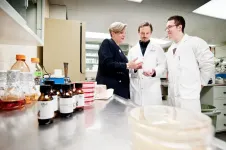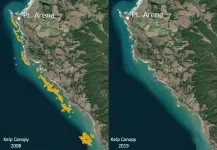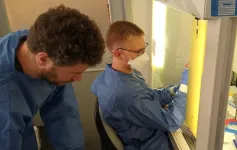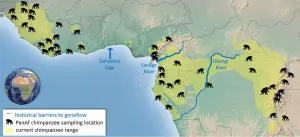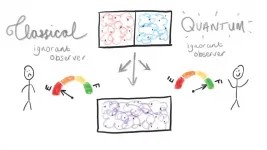Pandemic ratchets up pressure on people with substance use disorder
OHSU research concludes that health systems should incorporate the voices of marginalized patients to alleviate suffering and address systemic needs
2021-03-05
(Press-News.org) The COVID-19 pandemic has had a profound effect across society, but it has been especially devastating for people with substance use disorder.
A new study, published in the journal PLOS ONE, sheds light on the experience of patients with substance use disorder who were hospitalized during the initial surge of COVID-19 cases in Oregon last spring. Researchers with Oregon Health & Science University conclude that health systems nationwide could benefit from a better understanding of people who struggle with the basics.
"We need the system to be designed and implemented for patients who may lack phone access, who may not have access to WiFi or may be living on the streets," said lead author Caroline King, M.P.H., a health systems researcher and current M.D./Ph.D. student in the OHSU School of Medicine's bioengineering program.
King led the study with two other OHSU medical students, Taylor Vega and Dana Button.
Researchers conducted a series of interviews with 27 patients hospitalized at OHSU last April and May with acute medical or surgical conditions who also have substance use disorder.
The research was done through an OHSU program known as Project IMPACT, or Improving Addiction Care Team.
In normal circumstances, Project IMPACT brings together physicians, peer-recovery mentors, social workers and community addiction providers to address addiction when patients are hospitalized. However, during the first few months of the pandemic, IMPACT had more limited interactions with patients given new pandemic-related hospital policies implemented to prevent the spread of the SARS-CoV-2 virus.
Researchers identified four key takeaways from telephone interviews with patients.
Basic survival: For many of the patients who were interviewed, housing instability intensified due to the pandemic. They also struggled accessing food, employment, social services and bathrooms. Virtual recovery meetings such as Alcoholic Anonymous didn't help for many patients, half of whom didn't own a phone.
Hospital is a safety net: Although many participants were concerned about exposing themselves to the novel coronavirus by going to a hospital, many reported they had nowhere else to turn. Telehealth visits for outpatient services are not possible for those without phones or electronic devices. Some participants reported that a lack of readily available in-person medical care caused a cascade of medical issues that worsened to the point that they required hospitalization.
Hospital is isolating: Participants reported that they felt isolated due to the constraints on visitation and wearing of personal protective equipment by health care providers, although simultaneously comforted by the precautions taken to prevent the spread of the virus.
Uncertain transition home: Almost every patient interviewed expressed concern about leaving the hospital. For almost every patient, housing was a top worry. Participants worried they wouldn't be able to take care of their medical needs given shuttered community services and broad disruptions in the medical and social safety net.
Senior author Honora Englander, M.D., an associate professor of medicine (hospital medicine) in the OHSU School of Medicine who directs Project IMPACT, said the study makes clear that properly caring for these patients does not end when they're wheeled out of the hospital's front doors.
In some ways, the most difficult part of their journey only begins there.
"What does it mean to be 'medically ready' for discharge if a patient is leaving to an unsafe situation with no phone or housing in a pandemic?" Englander said. "We have a role to play as advocates in direct patient care, and as health care providers we can also apply pressure on powerful and sometimes-inflexible systems to make their care better."
INFORMATION:
ELSE PRESS RELEASES FROM THIS DATE:
2021-03-05
A combined treatment of irradiation and essential oil vapors could effectively destroy insects, bacteria and mold in stored grains. A team from the END ...
2021-03-05
Being able to make blind people see again sounds like the stuff of miracles or even science fiction. And it has always been one of the biggest challenges for scientists. Diego Ghezzi, who holds the Medtronic Chair in Neuroengineering (LNE) at EPFL's School of Engineering, has made this issue a research focus. Since 2015, he and his team have been developing a retinal implant that works with camera-equipped smart glasses and a microcomputer. "Our system is designed to give blind people a form of artificial vision by using electrodes to stimulate their retinal cells," says Ghezzi.
Read more: https://actu.epfl.ch/news/a-retinal-implant-that-is-more-effective-against-b/
Star-spangled sky
The camera embedded in the smart glasses captures images in the wearer's field of vision, and ...
2021-03-05
In order to stay alive, the cell must provide its various organelles with all the energy elements they need, which are formed in the Golgi apparatus, its centre of maturation and redistribution of lipids and proteins. But how do the proteins that carry these cargoes - the kinesins - find their way and direction within the cell's "road network" to deliver them at the right place? Chemists and biochemists at the University of Geneva (UNIGE), Switzerland, have discovered a fluorescent chemical dye, making it possible for the first time to track the transport ...
2021-03-05
More Antarctic meltwater is surfacing than was previously known, modifying the climate, preventing sea ice from forming and boosting marine productivity- according to new research from the University of East Anglia (UEA).
For the first time, researchers have been able to obtain full-depth glacial meltwater observations in winter, using instruments attached to the heads of seals living near the Pine Island Glacier, in the remote Amundsen Sea in the west of Antarctica.
The harsh environmental conditions in the Antarctic limit the use of most traditional observation systems, such as ships and airplanes, especially ...
2021-03-05
Researchers at Scripps Institution of Oceanography at UC San Diego examining 14 years of hospital admissions data conclude that the fine particles in wildfire smoke can be several times more harmful to human respiratory health than particulate matter from other sources such as car exhaust. While this distinction has been previously identified in laboratory experiments, the new study confirms it at the population level.
This new research work, focused on Southern California, reveals the risks of tiny airborne particles with diameters of up to 2.5 microns, about one-twentieth that of a human hair. These particles - termed PM2.5 - are the ...
2021-03-05
Satellite imagery shows that the area covered by kelp forests off the coast of Northern California has dropped by more than 95 percent, with just a few small, isolated patches of bull kelp remaining. Species-rich kelp forests have been replaced by "urchin barrens," where purple sea urchins cover a seafloor devoid of kelp and other algae.
A new study led by researchers at UC Santa Cruz documents this dramatic shift in the coastal ecosystem and analyzes the events that caused it. This was not a gradual decline, but an abrupt collapse of the kelp forest ecosystem in the aftermath of unusual ocean warming along the West Coast starting in 2014, part of a series of events that combined to decimate the kelp forests.
Published March 5 in Communications Biology, ...
2021-03-05
Quantitative real-time polymerase chain reaction (qPCR) is the most widely used diagnostic method to detect RNA viruses such as SARS-CoV-2. However, it requires expensive laboratory equipment and global shortages of reagents for RNA purification has increased the need to find simple but reliable alternatives. One alternative to the qPCR technology is RT-LAMP (reverse transcription loop-mediated isothermal amplification). This test amplifies the desired target sequences of the virus at a constant temperature, using minimal equipment compared to qPCR. In 2020, it was adapted to the detection of SARS-CoV-2. It was also shown that instead of a swab, which many people find unpleasant, it can be performed on gargle lavage samples.
First author Lukas Bokelmann and colleagues have now ...
2021-03-05
Researchers from the Pan African Programme: The Cultured Chimpanzee (PanAf) at the Max Planck Institute for Evolutionary Anthropology (MPI-EVA) and a team of international researchers, collected over 5000 fecal samples from 55 sites in 18 countries across the chimpanzee range over 8 years. This is by far the most complete sampling of the species to date, with a known location of origin for every sample, thus addressing the sampling limitations of previous studies. "Collecting these samples was often a daunting task for our amazing field teams. The chimpanzees were almost all unhabituated to human presence, so it took a lot of patience, skill and luck to find chimpanzee dung at each of the sites," explains ...
2021-03-05
Researchers have developed a new quantum version of a 150-year-old thermodynamical thought experiment that could pave the way for the development of quantum heat engines.
Mathematicians from the University of Nottingham have applied new quantum theory to the Gibbs paradox and demonstrated a fundamental difference in the roles of information and control between classical and quantum thermodynamics. Their research has been published today in Nature Communications.
The classical Gibbs paradox led to crucial insights for the development of early thermodynamics and emphasises the need to consider an experimenter's ...
2021-03-05
DUBLIN, Friday, 5 March 2021: RCSI researchers have discovered a new way to 'put the brakes' on excessive inflammation by regulating a type of white blood cell that is critical for our immune system.
The discovery has the potential to protect the body from unchecked damage caused by inflammatory diseases.
The paper, led by researchers at RCSI University of Medicine and Health Sciences, is published in Nature Communications.
When immune cells (white blood cells) in our body called macrophages are exposed to potent infectious agents, powerful inflammatory proteins ...
LAST 30 PRESS RELEASES:
[Press-News.org] Pandemic ratchets up pressure on people with substance use disorder
OHSU research concludes that health systems should incorporate the voices of marginalized patients to alleviate suffering and address systemic needs
